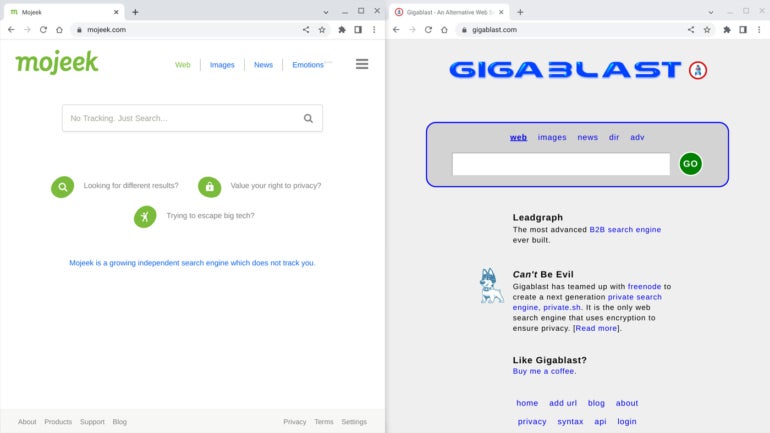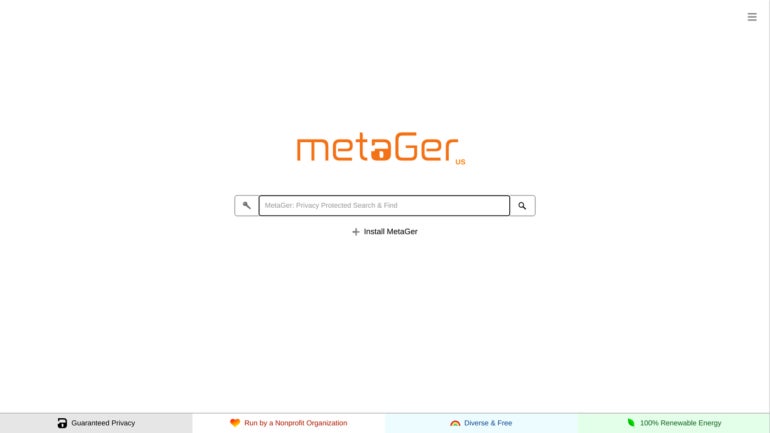- I replaced my iPhone 16 Pro with the 16e for a month - here's my buying advice now
- I changed these 5 TV settings for an instant performance boost - here's why they work
- I tested a $200 thermal camera to check my GCFI breaker - and it's very accurate
- I can't work without these 3 gadgets (and why they make such a big difference)
- Most CEOs think their CIOs lack AI savviness
How to expand your search sources

If you search the web in English, you most likely use Google. Search engine market share lists consistently show Google (Figure A, left) at more than 80% market share, with Microsoft’s Bing (Figure A, right) a distant second at around 8% market share. On mobile devices, even Apple selects Google as the default search provider.
Figure A

For searches with a single specific and factual answer, your choice between Google, Bing or another search provider may not matter. For example, both search engines provide rapid and accurate results when you want to know what year the IBM PC was first manufactured (1981) or which team won the Men’s 2022 FIFA World Cup (Argentina).
However, when your intent is to glean information from a wide range of sources, it makes sense to query different search engines. For example, searching both Google and Bing for “edge computing best practices” or “use vi and tmux” provides slightly different sets of linked pages to review.
The search alternatives covered below include not only truly independent search sources but also secondary search services. These secondary search services often depend on Bing or Google results that the service then filters and sorts differently than the source search indexes.
Jump to:
Explore independent search services
Beyond Google and Bing, the most significant independent English-language search engine is Mojeek, shown in Figure B, left. An October 2022 blog post claimed that Mojeek has more than 6 billion pages indexed. As a privacy-respecting service, Mojeek also chooses not to track you.
Another truly independent search engine is Gigablast, shown in Figure B, right, which also serves as the source index for searches conducted at Private.sh. However, the two sites prioritize and present results differently, with Gigablast grouping results from notable sources and Private.sh providing a conventional list of links.
Figure B

Seek a secondary search provider
Most search services rely on Bing or Google as a source for some — if not all — of their results. DuckDuckGo (Figure C, left), for example, partners with Microsoft for results from Bing, while Startpage (Figure C, right) syndicates results from Google.
Figure C

What distinguishes DuckDuckGo and Startpage from their search data sources, however, are their respective privacy policies: Both promise greater privacy and less tracking than Google or Bing. Qwant and Yahoo similarly source results from Bing, while Brave Search mixes in results from both Bing and Google. At least a couple start-up search engines, such as Kagi and Neeva, offer both free and paid plans that let you prioritize, filter and customize results.
Unlike the secondary search services listed above, which are all for-profit entities, MetaGer.org, shown in Figure D, is operated by a non-profit organization based in Germany. Like other secondary search services, it draws results from other sources, including Bing, Yahoo, Scopia and Infotiger. Not only may you switch any of these four sources on or off, MetaGer also lets you choose to exclude specific domains or subdomains from results.
Figure D

Directly search a relevant site
Some answers may best be obtained directly from a relevant source. Answers historically found in an encyclopedia or an atlas, for example, might be resolved with a search of Wikipedia.org or OpenStreetMap.org. Most major search and mapping services rely on these sources.
While once commonly questioned, the general reliability of Wikipedia as a source, in particular, has been thoroughly considered and addressed. Similarly, questions you might ask a knowledgeable colleague may be answered with a query of Stack Exchange, Stack Overflow, Quora or Wikihow. Answers from these sites may need to be evaluated with appropriate caution and consideration.
WolframAlpha (Figure E) provides an interesting example of a specialized research engine. The system relies on a set of sources selected for accuracy. For example, if you ask the system to give you the human population on Mars, it returns the number zero, as you would expect. WolframAlpha excels at mathematics and science calculations and questions, along with answers that may be derived from established history and facts. Both free and paid editions of WolframAlpha are available.
Figure E

Tor browser search options
People who use the Tor browser typically place a high priority on privacy that likely also extends to a preference for privacy-respecting search results. DuckDuckGo, MetaGer and Brave each offer search services that may be accessed via a Tor browser onion service, formerly known as a hidden service. You must access the onion links in the preceding sentence only from a Tor browser, as they will not work in a standard browser.
The results from these three providers return conventional websites and resources. However, since requests are routed over the Tor network to preserve privacy, the response times tend to be longer than a conventional search.
What’s your search experience?
Which search engines or secondary search providers do you use regularly? Do you rely solely on Google or Bing for results? How often do you use additional sources, such as DuckDuckGo, Mojeek or WolframAlpha? Mention or message me on Mastodon (@awolber) to let me know your preferred search services.

